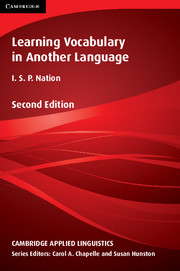Book contents
- Frontmatter
- Contents
- Series editors' preface
- Acknowledgements
- Introduction
- 1 The goals of vocabulary learning
- 2 Knowing a word
- 3 Teaching and explaining vocabulary
- 4 Vocabulary and listening and speaking
- 5 Vocabulary and reading and writing
- 6 Specialised uses of vocabulary
- 7 Vocabulary-learning strategies
- 8 Learning words from context
- 9 Word parts
- 10 Using dictionaries
- 11 Deliberate learning from word cards
- 12 Finding and learning multiword units
- 13 Testing vocabulary knowledge and use
- 14 Designing the vocabulary component of a language course
- Appendices
- Subject index
- Author index
8 - Learning words from context
Published online by Cambridge University Press: 15 February 2018
- Frontmatter
- Contents
- Series editors' preface
- Acknowledgements
- Introduction
- 1 The goals of vocabulary learning
- 2 Knowing a word
- 3 Teaching and explaining vocabulary
- 4 Vocabulary and listening and speaking
- 5 Vocabulary and reading and writing
- 6 Specialised uses of vocabulary
- 7 Vocabulary-learning strategies
- 8 Learning words from context
- 9 Word parts
- 10 Using dictionaries
- 11 Deliberate learning from word cards
- 12 Finding and learning multiword units
- 13 Testing vocabulary knowledge and use
- 14 Designing the vocabulary component of a language course
- Appendices
- Subject index
- Author index
Summary
Incidental learning from context is the most important of all the sources of vocabulary learning. This is particularly true for native speakers learning their first language. It should also be true for second language learners, but many do not experience the conditions that are needed for this kind of learning to occur. A major goal of this chapter is to look at these conditions and see how they can be established. We will look at how successful learners can be at guessing from context, how much and what kind of learning can occur from this guessing, and the kinds of clues available for guessing. We will then look at how learners can be helped to become skilful at guessing from context.
Which is best: intentional or incidental learning?
Learning vocabulary from context is often seen as something opposed to the direct intentional learning and teaching of vocabulary (Kelly, 1990). This is an unfortunate viewpoint and the position taken in this book is that they are complementary activities, each one enhancing the learning that comes from the other. A well-balanced language-learning programme has an appropriate range of opportunities to learn from message-focused activities and from direct study of language items, with direct study of language items occupying no more than a quarter of the total learning programme.
In this chapter, learning from context is taken to mean the incidental learning of vocabulary from reading or listening to normal language use while the main focus of learners' attention is on the message of the text.
- Type
- Chapter
- Information
- Learning Vocabulary in Another Language , pp. 348 - 388Publisher: Cambridge University PressPrint publication year: 2013

